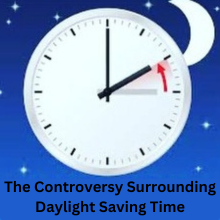
As we approach the end of Daylight Saving Time (DST) for 2024, many of us are gearing up to adjust our clocks. This year, the change will take place on Sunday, November 3rd, at 2 a.m. local time. But why do we even bother with this twice-a-year ritual? Let’s break it down!
Understanding Daylight Saving Time (DST)
What Is Daylight Saving Time?
Daylight Saving Time is the practice of setting the clock forward by one hour during the warmer months to extend evening daylight. This means that from March to November, our days seem a bit longer, which can be a real mood booster.
Why Do We Change Our Clocks?
The main goal is to make better use of daylight. By shifting an hour of daylight from the morning to the evening, it’s believed that we can save energy and enjoy more outdoor activities after work or school. But is it really that simple?
Key Dates for Daylight Saving Time 2024
When Does Daylight Saving Time End?
For 2024, we will “fall back” an hour on November 3rd. This change means an extra hour of sleep for most of us, but it can also lead to some confusion.
When Did It Begin in 2024?
DST kicked off earlier this year on March 10th. On that day, we moved our clocks forward one hour, marking the start of this annual tradition.
The Impact of Daylight Saving Time on Daily Life
Benefits of ‘Falling Back’
One of the biggest perks of the time change in November is that we gain an extra hour of sleep. Who doesn’t love that? Plus, it can make early mornings feel a little less daunting as the sun rises earlier.
The Drawbacks of Changing Clocks
Effects on Sleep
However, the end of DST isn’t all sunshine and rainbows. The transition can disrupt our sleep schedules. Some people might find it hard to adjust, leading to grogginess in the days following the change.
Disruptions to Children and Pets
Kids and pets can also be affected. Children may struggle with their bedtime routines, while pets might feel anxious due to the shift. After all, they don’t really understand why dinner time suddenly feels different!
The Controversy Surrounding Daylight Saving Time
Legislative Efforts to Change DST
The debate around DST isn’t new. Many people argue for its abolishment, claiming that the time changes are outdated and unnecessary.
The Sunshine Protection Act
In recent years, the U.S. Senate passed the Sunshine Protection Act, which aimed to make DST permanent. However, it has yet to gain traction in the House of Representatives.
Current Status in Congress
As of now, the future of DST remains uncertain, with discussions ongoing. Will we see the end of this practice in the near future? Only time will tell!
Which States Observe Daylight Saving Time?
States That Don’t Observe DST
Not every state jumps on the DST bandwagon.
Hawaii
Hawaii, for example, doesn’t observe DST at all. With minimal variation in daylight hours throughout the year, the state has opted out of this time change.
Arizona and Its Exceptions
Arizona, except for the Navajo Nation, also skips DST. The state’s scorching summer heat makes the extra daylight less appealing.
Fun Facts About Daylight Saving Time
Historical Background
Did you know that the idea of DST goes back to Benjamin Franklin? He suggested it as a way to conserve candles!
Global Perspectives on DST
Interestingly, not all countries practice DST. Many have chosen to stick with standard time year-round. In fact, countries near the equator often don’t see the need for it at all.
Tips for Adjusting to the Time Change
How to Prepare for the Transition
To make the adjustment easier, try to gradually shift your schedule in the days leading up to the time change. Go to bed and wake up a little earlier every day.
Strategies for a Smooth Adjustment
Creating a calming bedtime routine can also help, as well as avoiding screens before sleep. These small changes can make a big difference!
Conclusion
As we prepare to embrace the end of Daylight Saving Time on November 3rd, it’s a great opportunity to appreciate the little things—like that extra hour of sleep! While the transition can come with its challenges, being mindful and prepared can help ease the adjustment.
FAQs
Why do we have Daylight Saving Time?
Daylight Saving Time was introduced to make better use of daylight and to conserve energy.
Will DST ever be abolished?
There are ongoing discussions in Congress regarding the potential for abolishing DST, but no definitive action has been taken yet.
How does DST affect energy consumption?
Studies show mixed results regarding energy savings, with some arguing that it has little to no impact on overall consumption.
Can pets be affected by time changes?
Yes, pets can experience anxiety and changes in their routines due to the shift in time.
What should I do if I struggle to adjust?
Gradually adjusting your sleep schedule and creating a calming bedtime routine can help ease the transition.

